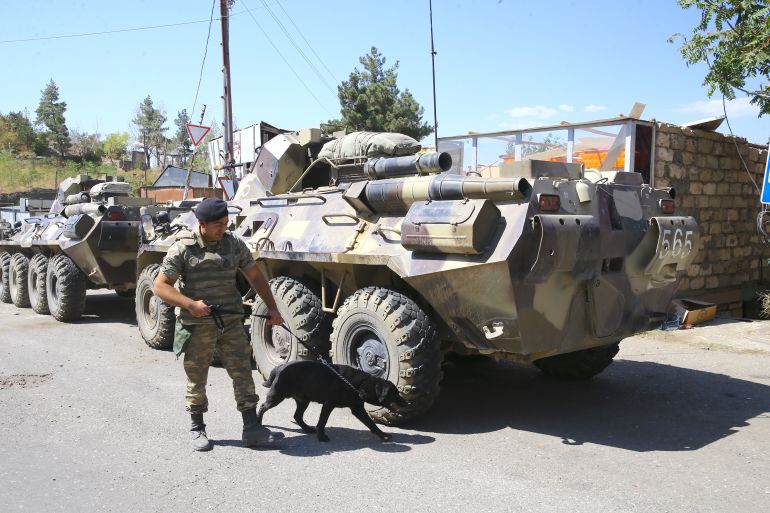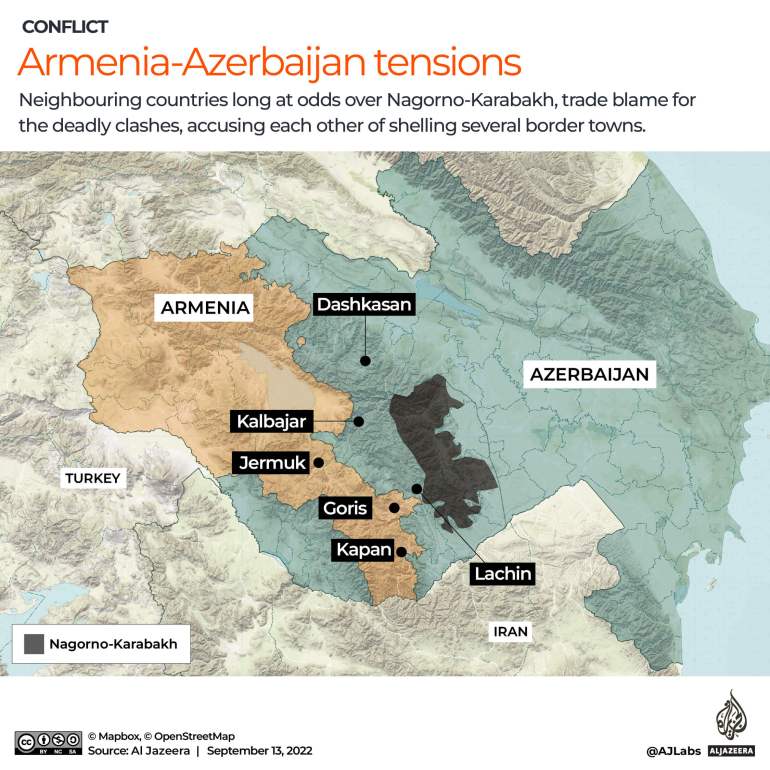Armenia, Azerbaijan trade blame for new ceasefire violations
Baku and Yerevan each accused the other side of firing first in renewed clashes along their shared border overnight.

Armenia and Azerbaijan have accused each other of breaking a fragile ceasefire agreement that had brought the worst fighting between the two ex-Soviet countries since 2020 to a close last week.
In statements issued by their defence ministries on Friday morning, Baku and Yerevan each accused the other side of firing first in renewed clashes along their shared border overnight.
Keep reading
list of 3 itemsPelosi slams Azerbaijan’s ‘illegal’ attacks during Armenia visit
Nancy Pelosi visits Armenia amid conflict with Azerbaijan
Following two days of clashes that killed nearly 200 soldiers early last week, the two sides agreed to a ceasefire, brokered by Russia, to end hostilities, though the situation on the border has remained tense.
“On September 23, at 07:40 (03:40 GMT), units of the Azerbaijani armed forces again violated the ceasefire regime by firing from different positions against Armenian combat positions located in the eastern area of the Armenian-Azerbaijani border,” Armenia’s defence ministry said in a post on Facebook on Friday.
“The enemy’s fire was suppressed by retaliatory actions,” Armenia added, reporting no casualties.
Shortly after the Armenian statement, Azerbaijan’s defence ministry issued a response, saying it was Armenia that opened fire first.
Baku said Armenia’s armed forces had opened fire on three different areas of the shared border, “intermittently shelling positions of the Azerbaijani armed forces with mixed-caliber small arms” over nine hours starting at 11:45pm (19:45 GMT) on Thursday night.
In a statement published on the Telegram messaging app, Azerbaijan’s defence ministry also said it had taken “adequate retaliatory measures”.

‘Unspeakable atrocities’
On Thursday, Armenian Prime Minister Nikol Pashinyan used his address before the United Nations to accuse Azerbaijan of “unspeakable atrocities” during the latest clashes between the two rivals, including mutilating the bodies of dead soldiers.
“There are evidences of cases of torture, mutilation of captured or already dead servicemen, numerous instances of extrajudicial killings and ill-treatment of Armenian prisoners of war, as well as humiliating treatment of the bodies,” he told the UN General Assembly.
“The dead bodies of Armenian female military personnel were mutilated, and then proudly video recorded with particular cruelty by the Azerbaijani servicemen.”
As Pashinyan spoke, Azerbaijan’s foreign minister Jeyhun Bayramov, who is set to address the global body this weekend, watched impassively.
Pashinyan went on: “No doubt, committing such unspeakable atrocities is a direct result of a decades-long policy of implanting anti-Armenian hatred and animosity in the Azerbaijani society by the political leadership.”
He also accused Azerbaijan of shelling civilian facilities and infrastructure deep inside his country’s territory, displacing more than 7,600 people, as well as leaving three civilians dead and two missing.
“This was not a border clash. It was a direct, undeniable attack against the sovereignty and the territorial integrity of Armenia,” he said.
The speech comes just days after US Secretary of State Antony Blinken urged peace between the two sides in a meeting where he hosted both countries’ top diplomats.
Renewed fighting
Fighting between the neighbours erupted earlier this month in clashes that left almost 200 soldiers dead – the bloodiest confrontation since a six-week war between the two ex-Soviet countries in 2020.
The fighting is linked to decades-old hostilities over control of the Nagorno-Karabakh region, internationally recognised as part of Azerbaijan but until 2020 largely controlled by the majority ethnic Armenian population.
Armenia said Azerbaijan attacked its territory and seized settlements inside its borders, beyond the disputed Nagorno-Karabakh region. Azerbaijan said it was responding to “provocations” from the Armenian side.
Russia is a military ally of Armenia though also tries to maintain friendly relations with Azerbaijan and has resisted Yerevan’s calls to trigger a mutual self-defence clause. Baku is backed militarily, financially and politically by Turkey.